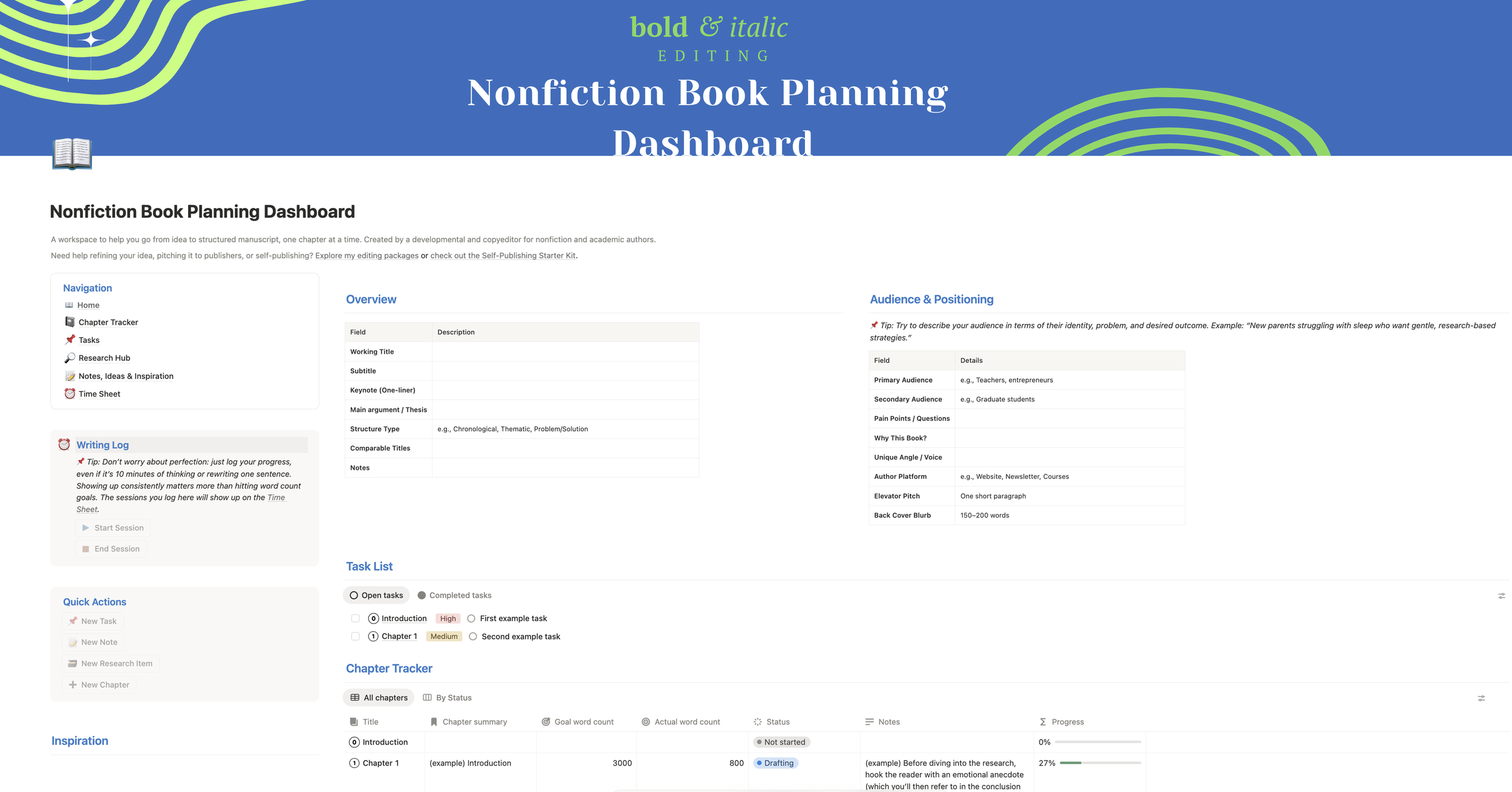Why Notion Works So Well for Writers and Self-Publishing Authors
(Just to be clear: this post isn’t sponsored by Notion. I just really, really like it.)
If I could wave a magic wand and give every author one tool to simplify their writing life, it would be Notion. Not because it’s trendy. Not because it’s pretty (though it is!). But because it’s the most flexible, intuitive, and empowering workspace I’ve ever used – and I’ve spent over a decade wrangling editorial workflows, publishing pipelines, and author chaos.
From Excel Queen to Notion Evangelist
Back when I was an editorial assistant—and later an assistant editor, and later a commissioning editor—managing over 200 books a year, I was the undisputed Excel queen of the office. Complex macros? Bring them on. Conditional formatting that turned project delays bright red? Chef’s kiss. I could wrangle a publishing schedule like nobody’s business. In another life, I might have joined Excel Esports—yes, it’s real. A global competition where people solve wild, game-like tasks in Excel. (It’s more thrilling than it sounds. Slightly.)
But then I discovered Notion, and suddenly the world of spreadsheets looked … flat. Notion gave me everything I loved about Excel—structure, logic, the satisfying click of a well-designed system—and combined it with the fluid creativity I’d get from my bullet journal. It didn’t just store data; it told a story. Notion isn’t a spreadsheet. It’s an ecosystem. It houses databases (which are, let’s be honest, just spreadsheets that learned to dress well) alongside notes, links, images, to-do lists, and embedded docs. It’s endlessly adaptable, customizable, and, yes, “aesthetic,” as the kids say. Now I use Notion for everything. And I mean everything!
My fitness routine: workouts, meal planning, progress logs.
My family life: Christmas hosting, grocery lists, even potty-training charts 🙃
My editorial projects: proposals, edits, timelines, invoices.
My business: client dashboards, templates, and the very system I built for my Self-Publishing Guided Workflow. Here’s a snapshot of my navigation bar:
Notion is a Second Brain for Authors
So why should authors—especially self-publishing authors—use Notion? Because writing a book isn’t just “writing.” It’s managing a long, layered, deeply personal project with hundreds of moving parts. It’s research, structure, notes, permissions, deadlines, drafts, feedback, metadata, marketing, and more. Notion lets you see the big picture and the tiny details. You can plan your outline, track revisions, store research, build your publishing checklist, and even design your launch, all in one place. No more 47 browser tabs or mystery files called “final_FINAL_reallythisone.docx.” Sure, there’s a learning curve. But once you’ve seen your writing life organized in one clean, visual, beautiful space, you’ll never go back.
Customizable Without the Chaos
Unlike rigid tools that force you into their way of thinking, Notion adapts to yours. Whether you’re a linear thinker or a mind-mapper, you can build pages, databases, and templates that reflect how you work. And if you’re not sure where to start? There are templates galore—and I’ve built several specifically for nonfiction authors, from Permissions Clearance Trackers to Metadata Builders.
It Honors Your Voice and Your Process
As an editor, I care deeply about preserving authorial voice while making the publishing process less overwhelming. Notion helps with both. You can:
Create a dashboard that tracks your entire publishing journey
Draft directly in Notion or link out to your preferred writing tool
Track feedback and revisions without drowning in email threads
Store permissions, contracts, and image licenses in one place
Build a style sheet that evolves with your manuscript
Keep your acknowledgments, citations, and resources organized and accessible
If you’re not ready to invest in a full website, you can even create a free, basic author website through Notion
It’s like having a digital assistant who never forgets, never misfiles, and never asks “Where did you put that?”
A screenshot of my nonfiction book planning dashboard, which you can duplicate for free and customize to your needs.
It Grows With You
Whether you’re writing your first book or managing a multi-title publishing pipeline, Notion scales. You can start with a simple dashboard and expand into a full editorial system. You can collaborate with editors, designers, and beta readers. You can even use it to plan your launch, track your marketing, and build a reader-facing knowledge base.
Some Great Notion Templates for Authors
There’s a whole section of the Notion Marketplace dedicated to Writing templates: https://www.notion.com/templates/category/writing?srsltid=AfmBOopHNBDVHLOCh9tGCwr76RXBizL3Zrcy3xxZDQl0nRFPgRTOVHjw
Personally, these are the ones I would recommend:
and my own Nonfiction Book Planning Dashboard (which is completely free)
The Bottom Line
Notion isn’t magic, but it feels close. It’s the one place where I can plan a book launch, track a client project, prep Christmas dinner, and remind myself to buy more Naked bars—all without losing my mind. For authors, especially those navigating self-publishing, that kind of structure is priceless. It means your energy goes into the work that matters—writing, revising, creating—rather than juggling files and forgetting which version is final.
If you’ve been meaning to get organized but don’t know where to start, I’m currently looking for three testers for my upcoming Self-Publishing Guided Workflow in Notion. It’s an expanded version of my Starter Kit:an all-in-one dashboard that walks you through every stage of publishing your book, from final draft to launch week. Testers get FREE early access, plus the chance to shape how the final version evolves.



